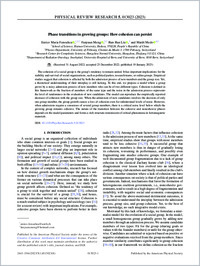Phase transitions in growing groups: How cohesion can persist
DOKPE
- Fenoaltea, Enrico Maria ORCID University of Fribourg
- Meng, Fanyuan ORCID Hangzhou Normal University
- Run-Ran, Liu ORCID Hangzhou Normal University
- Medo, Matus ORCID University of Fribourg
- 19.01.2023
Published in:
- Physical Review Research. - American Physical Society (APS). - 2023, vol. 5, no. 1
Phase transition
complex systems
sociophysics
growing groups
social cohesion
Ising model
nonlinear dynamic
English
The cohesion of a social group is the group’s tendency to remain united. It has important implications for the stability and survival of social organizations, such as political parties, research teams, or online groups. Empirical studies suggest that cohesion is affected by both the admission process of new members and the group size. Yet, a theoretical understanding of their interplay is still lacking. To this end, we propose a model where a group grows by a noisy admission process of new members who can be of two different types. Cohesion is defined in this framework as the fraction of members of the same type and the noise in the admission process represents the level of randomness in the evaluation of new candidates. The model can reproduce the empirically reported decrease of cohesion with the group size. When the admission of new candidates involves the decision of only one group member, the group growth causes a loss of cohesion even for infinitesimal levels of noise. However, when admissions require a consensus of several group members, there is a critical noise level below which the growing group remains cohesive. The nature of the transition between the cohesive and noncohesive phases depends on the model parameters and forms a rich structure reminiscent of critical phenomena in ferromagnetic materials.
- Faculty
- Faculté des sciences et de médecine
- Department
- Département de Physique
- Language
-
- English
- Classification
- Physics
- License
- CC BY
- Open access status
- gold
- Identifiers
-
- DOI 10.1103/PhysRevResearch.5.013023
- ISSN 2643-1564
- Persistent URL
- https://folia.unifr.ch/unifr/documents/324699
Statistics
Document views: 44
File downloads:
- phasetransitionsingrowinggroups-howcohesioncanpersist.pdf: 132
